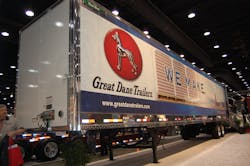Phase II GHG rules could pose issues for trailer OEMs, says Great Dane
Regulation of trailers is almost a certainty under Phase II of the Greenhouse Gas (GHG) rule currently being drafted by the Environmental Protection Agency (EPA) and the National Highway Traffic Safety Administration (NHTSA), according to Great Dane. The good news is that the regulatory agencies involved are seeking input from engine, tractor and trailer manufacturers on how proposed fuel-efficiency standards might impact their businesses and the implications associated with them.
Great Dane, along with others, has been working with the EPA in Ann Arbor, MI for some months to help the agency understand the technical aspects of trailer manufacture and use, Charles Fetz, vice president, design and development for Great Dane told Fleet Owner in a recent interview.
“I am pleased with what the EPA has done and with the progress we’ve made as a team,” he said. “The EPA has done a very good job and we [on the industry side] have worked to understand the regulatory process.” Fetz also noted that he is hopeful that regulators will take into account the recommendations of the Ann Arbor team in the drafting of the Notice of Proposed Rulemaking, anticipated by March 2016.
In November last year, Great Dane published a whitepaper titled, “What you need to know about proposed Phase II Greenhouse Gas standards in the trucking industry,” authored by Fetz. In the whitepaper, he noted that, “While these proposed rules may open new opportunities for making tractor trailers as efficient as possible—a shared goal by government and the trucking industry—additional performance regulations have the potential to open a whole host of complexities and potential issues that the government regulators need help in identifying and understanding.”
Many of the concerns Fetz identifies center around “the difficulty of creating a regulation for an industry where a high degree of customer-specified customization and critical variations in product configurations and specifications are the norm.:”
This list includes issues such as:
- Whether the regulations will limit the ability to manufacture trailers according to customer demands, resulting in operational constraints for fleets and problems for shippers.
- The potential for these pending regulations to create business fluctuations in the tractor-trailer market, “creating a peak demand and then an artificial fall-off of demand in subsequent years."
- The difficulty in establishing a regulation for trailers specifically because of the vast number of factors that affect fuel efficiency, such as tire selection, weight and aerodynamic device compatibility, which are largely beyond the control of OEMs and may be potentially adverse to carriers.
Fetz told Fleet Owner that he expects the Phase II GHG regulation to begin with van trailers, noting that “there will be exemptions.” Ideas of averaging, of banking and trading credits, are being discussed, he noted—the idea being that OEMs could “borrow” credits received from the manufacture of their most-efficient trailers to allow them to make other trailers that customers need but that are not as efficient under the terms of the regulation.
In conjunction with the publication of the whitepaper, Great Dane also invited other OEMs and carriers to “share their critical information with us” through a brief survey, which can be completed anonymously or for attribution. The information gathered will be tabulated and masked and shred in discussions with EPA and NHTSA to “help provide the most complete picture possible to help shape this regulation and advise the agencies on factors relevant to the regulations’ potential impact on our industry.”
When it comes to offering advice, Fetz noted that he is confident “trailers will be regulated,” and advised other trailer makers “to make recommendations to tractor OEMs” on what could/should be regulated and what is just not practicable, including trying to restrict tractor-trailer pairings.
About the Author
Wendy Leavitt
Wendy Leavitt is a former FleetOwner editor who wrote for the publication from 1998 to 2021.
